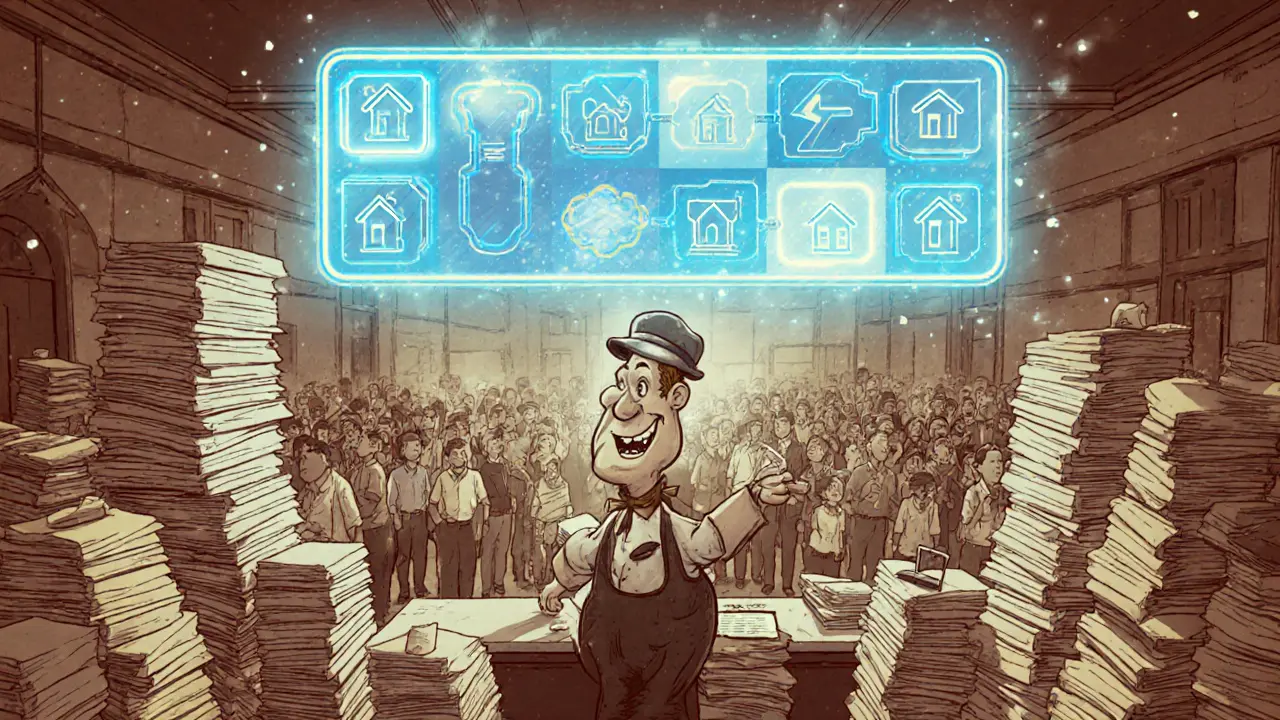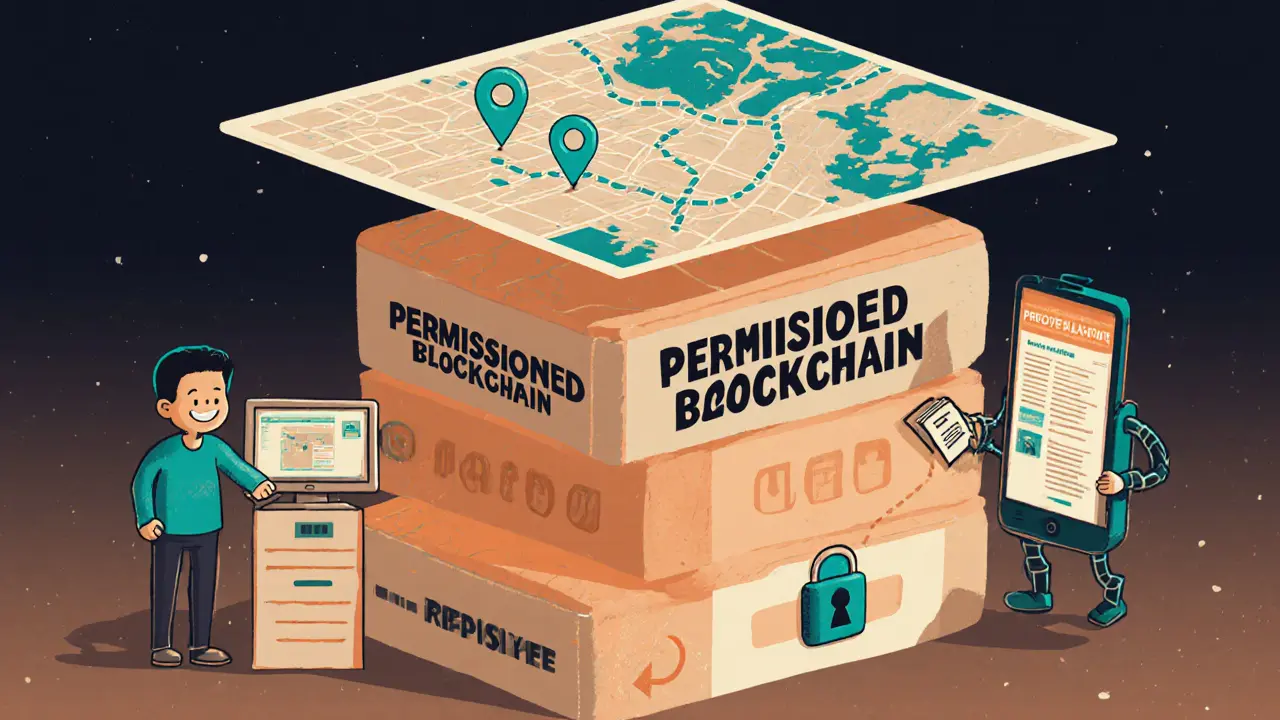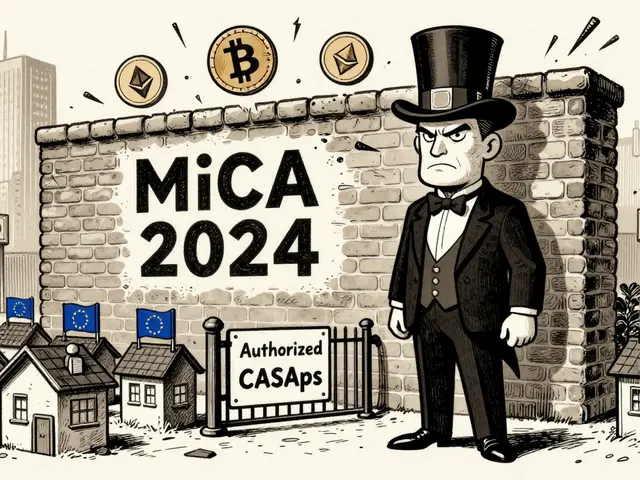
Blockchain Land Registry Impact Calculator
Potential Benefits
How It Works
This calculator shows how blockchain land registry systems can dramatically reduce processing time and costs compared to traditional methods. The key advantages include:
- Processing time reduced from days to minutes
- Transaction fees slashed from $50-$200 to less than $0.10
- Immutable records prevent fraud and duplicate titles
- Smart contracts automate ownership transfers
When you think about buying a house, you picture paperwork, long queues, and hidden fees. Blockchain land registry is a decentralized, tamper‑proof system that records property ownership and transfers on a distributed ledger. By moving the registry onto a blockchain, governments can cut processing time from weeks to minutes, slash fees by up to 99.8%, and dramatically curb fraud.
What Is a Blockchain Land Registry System?
A blockchain land registry replaces the traditional, paper‑heavy land‑records office with a digital ledger that anyone can audit but no one can alter. Each property record is stored as a block linked to the previous transaction, creating an immutable chain of ownership. The system typically runs on a permissioned blockchain a closed network where only authorized government agencies and approved participants can write data, ensuring privacy while retaining transparency.
Core Benefits
- Speed: Registration that once took 3‑5 days in Georgia now completes in under three minutes.
- Cost reduction: Transaction fees fell from $50‑$200 to as low as $0.10 per record in the Georgian pilot.
- Fraud prevention: Immutable records eliminate duplicate titles and fake deeds.
- Transparency: Anyone can verify the full ownership history without contacting a clerk.
- Automation: Smart contracts self‑executing code that enforces contract terms trigger ownership transfer once payment is confirmed.

Real‑World Implementations
| Country | Platform | Scope | Notable Outcome |
|---|---|---|---|
| Georgia | Hyperledger Fabric | National land registry | Processing time <3min; fees <$0.10 |
| India | Ethereum (permissioned) | Multiple states, pilot in Andhra Pradesh | Reduced duplicate sales; integrated with Aadhaar ID |
| Ghana (Bitland) | Hyperledger Fabric | Parcel‑level metadata + satellite imagery | Improved record accuracy in rural areas |
| Brazil (Pelotas) | Ethereum | Municipal property database | Automated zoning compliance checks |
Technical Architecture
Most deployments follow a three‑layer stack:
- Trust Layer: A permissioned blockchain (e.g., Hyperledger Fabric an enterprise‑grade ledger offering modular consensus or a permissioned Ethereum smart‑contract platform adapted for private networks stores the immutable record.
- Application Layer: Web portals and mobile apps handle user onboarding, document upload, and digital signatures. Government‑issued IDs are encrypted and linked to a unique blockchain address.
- Integration Layer: APIs connect the ledger to existing land‑registry software, tax systems, and GIS databases (GPS coordinates, satellite images).
When a seller initiates a transfer, a smart contract code that verifies seller credentials, buyer payment, and any regulatory checks runs automatically. If all conditions pass, the contract writes a new block, updating the owner field and timestamp.
Implementation Roadmap & Checklist
Governments typically follow a phased approach. Below is a practical checklist that covers the most common jobs‑to‑be‑done.
- Phase1 - Data Preparation
- Audit existing paper records; resolve active disputes.
- Digitize titles, attach GPS coordinates, and assign a unique property ID.
- Load legacy data onto a secure staging ledger after legal sign‑off.
- Phase2 - Platform Selection
- Choose a permissioned blockchain (Hyperledger Fabric for high throughput; Ethereum for smart‑contract richness).
- Define governance model: who can write, read, and audit.
- Phase3 - Identity & Access
- Integrate national ID system (e.g., Aadhaar in India) for cryptographic keys.
- Implement multi‑factor authentication for land inspectors.
- Phase4 - Pilot Deployment
- Select a small jurisdiction (e.g., 500 parcels).
- Run end‑to‑end transactions; collect user feedback.
- Measure processing time, cost, and error rate.
- Phase5 - Scale‑Up
- Roll out to additional regions; train staff and the public.
- Establish legal recognition of blockchain records in property law.
Key success factors include strong political commitment, clear legal frameworks, and a robust stakeholder training program.

Challenges & Mitigations
- Legacy Data Migration: High upfront cost; mitigate by phased digitization and using open‑source tools for bulk import.
- Digital Divide: Citizens without biometric IDs may be excluded; address with community onboarding centers and paper‑to‑digital conversion assistance.
- Legal Recognition: Blockchain records must be incorporated into national land laws; work with legislators early in the project.
- Interoperability: Different jurisdictions may use various blockchains; adopt standardized metadata (e.g., International Land Coalition schema) to enable cross‑border transactions.
Future Outlook & Market Trends
The global market for blockchain land‑registry solutions is projected to jump from $127million in 2022 to $1.84billion by 2028, driven by a 53.7% CAGR. Asia‑Pacific leads with massive state‑level pilots in India, while Africa shows the fastest growth due to acute land‑title gaps. Emerging trends include:
- Integration with biometric ID platforms for zero‑knowledge proof verification.
- Inter‑registry marketplaces allowing cross‑border property trades.
- AI‑enhanced dispute detection using immutable transaction histories.
According to the World Bank, secure digital land records could lift up to 1billion people out of poverty by providing enforceable property rights.
Frequently Asked Questions
How does a blockchain land registry prevent fraud?
Because every transaction is cryptographically linked to the previous one, anyone trying to alter a title would have to rewrite the entire chain - an infeasible task. Duplicate registrations are instantly flagged when the same parcel ID appears in a new block.
Do property owners need to understand blockchain technology?
No. The user‑facing portal hides the technical details. Owners only need a digital ID and a mobile app or web login; the system handles the ledger interactions behind the scenes.
Can existing disputes be resolved by the blockchain?
The blockchain records the current claim but does not adjudicate historic disputes. Courts or land commissions must still settle ownership conflicts before the data is entered.
What’s the difference between permissioned and public blockchains in this context?
Permissioned chains restrict who can write data, which protects privacy and meets regulatory requirements. Public chains allow anyone to participate but expose transaction details, making them less suitable for sensitive land records.
How long does a full‑scale rollout usually take?
A typical national rollout ranges from 6 to 9 months after legacy data migration is completed, with pilot phases lasting 3‑4 months to iron out user‑experience issues.





Comments (12)
Ali Korkor
This is actually huge. Imagine not having to wait weeks just to prove you own your house. Blockchain isn't just for crypto nerds anymore-it's fixing real problems.
Akinyemi Akindele Winner
Oh so now the rich will just code their way out of paying taxes and ghosting the poor? Blockchain ain't magic-it's just a new way to lock people out while the elites high-five over their digital deeds.
Serena Dean
Georgia’s pilot is the gold standard here. They cut processing time from days to minutes and fees from $200 to a dime. That’s not innovation-that’s liberation. Other countries are still stuck in 1987 while Georgia’s already on Mars.
Sean Huang
Wait… so you’re telling me a government system that can't be altered… is being run by… people? Who have access? Who can edit permissions? You think that's secure? This is just a fancy database with a blockchain label glued on. The NSA already owns the keys. You're being played
Zach Crandall
While the technical merits are undeniable, one must consider the epistemological implications of delegating property rights to immutable cryptographic structures. The ontological security once conferred by physical deeds and clerical authority is now replaced by algorithmic determinism-a shift that erodes the humanistic foundation of land tenure. One must ask: is efficiency worth the loss of interpretive flexibility in legal tradition?
MANGESH NEEL
Oh please. You think this works in places with real corruption? In India, even the paper records are sold to the highest bidder. You think a blockchain stops a bureaucrat from selling the same plot to ten people? It doesn't matter if it's immutable if the first entry is a lie. This is tech-washing for the gullible. The problem isn't the system-it's the people running it.
madhu belavadi
I remember my uncle in Kerala spent 11 years fighting over land. His brother forged documents. The court was slow. The clerk took bribes. I cried when he finally got the title. This system… it could’ve saved him. I’m not even techy but I feel this in my bones.
Dick Lane
Just had to say this-this is the kind of change that actually matters. Not another app that lets you order tacos faster. This is about people’s homes. Their legacy. Their dignity. Thank you for sharing this. I’m sharing it with my whole family.
Norman Woo
blockchain land regestry? sounds like a scam. how do you know the first record is real? what if the gov just puts in fake data at the start? then its all fake. also who’s gonna pay for all these servers? its just the rich getting richer with fancy tech. i dont trust it
James Young
You’re all missing the point. This system only works if you have a functioning judiciary and digital infrastructure. In most developing countries, you can’t even get Wi-Fi in the land office. This is a solution looking for a problem that doesn’t exist outside of Silicon Valley fantasyland. Stop pretending tech fixes everything.
Chloe Jobson
Permissioned blockchain + smart contracts = audit trail + automated execution. Reduces friction, eliminates intermediaries, and ensures provenance. The real win is interoperability with existing legal frameworks-this isn’t replacing law, it’s augmenting it with verifiable trust layers.
Patrick De Leon
Georgia did it right. Ireland? We’d have 14 committees, 30 public consultations, and a court case before the first block was written. This is why we’re still using parchment. The rest of the world moved on. We’re still arguing about the pen.